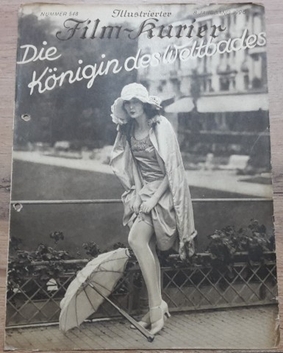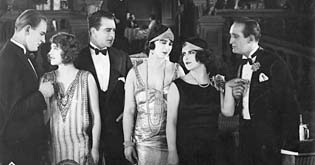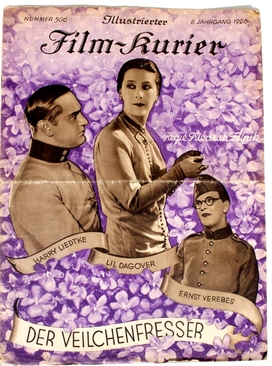
Wolfgang Zilzer was a German-American stage and film actor, often under the stage name Paul Andor.

Wibbel the Tailor is a 1931 German comedy film directed by Paul Henckels and starring Henckels, Thea Grodyn, and Wolfgang Zilzer. It is an adaptation of the 1913 play of the same title by Hans Müller-Schlösser. There are no copies of the film known.
The Adventurers is a 1926 German silent adventure film directed by Rudolf Walther-Fein and starring Harry Liedtke, Erna Morena and Margarete Schlegel. The art direction was by Jacek Rotmil. The film was based on a novel by Rudolf Herzog. It premiered in Berlin on February 11, 1926.
Crucified Girl is a 1929 German silent drama film directed by Jacob Fleck and Luise Fleck and starring Valerie Boothby, Gertrud de Lalsky and Evelyn Holt. It was shot at the Johannisthal Studios in Berlin. The film's art direction was by Artur Gunther and August Rinaldi.
The Third Squadron is a 1926 German silent war film directed by Carl Wilhelm and starring Fritz Spira, Eugen Burg, and Reinhold Häussermann. It was shot at the EFA Studios in Berlin and on location in Vienna. The film's art direction was by Otto Erdmann and Hans Sohnle. It was based on a play by Bernhard Buchbinder.

The Long Intermission is a 1927 German silent drama film directed by Carl Froelich and starring Henny Porten, Wolfgang von Schwindt and Livio Pavanelli. It is based upon the play written by Oscar Blumenthal and Max Bernstein.

Chamber Music is a 1925 German silent drama film directed by Carl Froelich and starring Henny Porten, Ida Wüst, Harry Halm, and Ferdinand von Alten.

Youth of the Big City is a 1929 German silent drama film directed by Rudolf Walther-Fein and starring Harry Liedtke, Ida Wüst and Maria Paudler.
Love Is the Power of Women is a 1924 German silent drama film directed by Erich Engel and Georg Bluen and starring Fern Andra, Henri Peters-Arnolds, and Fred Immler. The film's sets were designed by the art directors Bernhard Schwidewski and Oscar Friedrich Werndorff.
Nixchen is a 1926 German silent film directed by Kurt Blachy and starring Hans Albers, Heinrich Peer and Olga Limburg. It is based on a novel of the same title by Hans von Kahlenberg.
Hotel of Secrets or The Adventuress from Biarritz is a 1929 German silent film directed by Friedrich Feher and starring Gertrud Eysoldt, Magda Sonja and Angelo Ferrari. It was shot at the Staaken Studios in Berlin and on location in Biarritz. The film's art direction was by Ernst Meiwers and Ernö Metzner.

The Queen of the Baths is a 1926 German silent comedy film directed by Victor Janson and starring Mary Nolan, Walter Rilla and Livio Pavanelli.

Eve's Daughters is a 1928 Czech-German silent drama film directed by Karel Lamač and starring Anny Ondra, Karel Lamač and Wolfgang Zilzer.
When the Mother and the Daughter is a 1928 German silent film directed by Carl Boese and starring Fritz Spira, Trude Hesterberg, and Vera Schmiterlöw.

My Friend the Chauffeur is a 1926 German silent comedy film directed by Erich Waschneck and starring Hans Albers, Ferdinand von Alten and Barbara von Annenkoff.

The Violet Eater is a 1926 German silent comedy film directed by Frederic Zelnik and starring Lil Dagover, Harry Liedtke and Ernö Verebes. It was shot at the Staaken Studios in Berlin. The film's sets were designed by the art director Andrej Andrejew. It premiered at the Marmorhaus in Germany's capital.

Retreat on the Rhine is a 1930 German musical comedy film directed by Jaap Speyer and starring Charlotte Susa, Hans Stüwe, and Hermann Böttcher. It was made as an operetta film which emerged as a popular genre following the arrival of sound film.

Kissing Is No Sin is a 1926 German silent comedy film directed by Rudolf Walther-Fein and Rudolf Dworsky and starring Xenia Desni, Ellen Plessow, and Livio Pavanelli.
A Girl of the People is a 1927 German silent historical drama film directed by Jacob and Luise Fleck and starring Xenia Desni, Harry Liedtke and Livio Pavanelli.

The Woman of Yesterday and Tomorrow is a 1928 Austrian silent drama film directed by Heinz Paul and starring Arlette Marchal, Vivian Gibson, Livio Pavanelli. It is based on the novel of the same title by Alfred Schirokauer. The film's sets were designed by the art director Hans Ledersteger.












